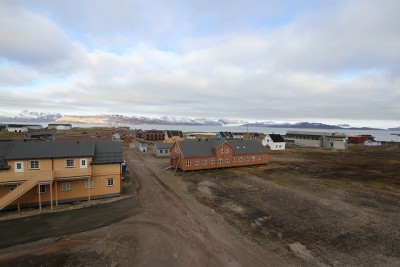Residents of Norway’s Arctic archipelago of Svalbard are literally banking on the Norwegian government extending financial aid for their troubled coal mining operations, despite the environmental paradox that implies. Now they’re hoping that tensions between Norway and Russia will help keep Svalbard’s coal mines open, if only to keep the remote area populated.

Newspaper Aftenposten reported during the weekend how people in Svalbard’s main settlement of Longyearbyen are joking that Russian President Vladimir Putin “is our best friend.” His government’s power plays in the Arctic and elsewhere just may save the local coal mining company Store Norske Spitsbergen Kulkompani, which is struggling because of a dive in coal prices and the climate concerns that its product creates.
The paradox of Norway’s decades of coal mining in the environmentally sensitive Arctic is becoming clearer by the week, as Norwegian politicians debate coal and climate issues in Oslo. Labour Party leader Jonas Gahr Støre was the latest to be confronted over how hypocritical it seems for him to urge Norway’s huge oil fund to dump coal investments abroad, while at the same time urging the government to give more state aid for coal mining on Svalbard.
Strange political bedfellows
Støre admitted that was “a paradox” on NRK radio Sunday, but suggested it was more important to keep the island’s main industrial venture going at a time when Russia is acting aggressively both in the Arctic and elsewhere. It’s more important than ever, argue politicians across party lines, for Norway to maintain an active and firm presence on Svalbard, if only to keep the Russians in check. The issue has resulted in one of the rare occasions when politicians within Labour, on the left, seem to agree with their rivals in the Progress Party, on the right, that Norway needs to keep Svalbard’s coal mines open and active for strategic reasons, as the cornerstone of the local economy and a reason for Norwegian presence in the area.
“If we have to leave Svalbard, there are many nations (including both Russia and China) that are very interested in getting a foothold here,” Per Nilssen, who works at the mine, told Aftenposten. All those who lost their jobs when the coal company laid off 100 workers last fall have had to move. “They moved down to the mainland,” said Nilssen’s wife Anne Lise Alexandersen, who also works for Store Norske. “There aren’t any other jobs for them up here.”
Researchers and intelligence officials are already worried that Svalbard is an area where Russian and Norwegian interests may collide. Newspaper Klassekampen also recently reported that Russia is protesting Norway’s decision to open more oil fields near Svalbard, claiming that Norway lacks jurisdiction in the area. Russian interests have, with Norwegian permission, conducted seismic exploration in the area and Russia is once again raising territorial issues in the Arctic.
“I don’t think we’ll see a Russian military attack on Svalbard, but situations can arise where Norway is put under pressure,” Jakub Godzimirski, a senior researcher specializing in Russian affairs at the Norwegian foreign policy institute NUPI, told Aftenposten. “It’s important to have a Norwegian population on Svalbard, and to show we have a reason to be there.”
Climate concerns melt away
That reason has, in many ways, been the coal company since its founding in 1916. Tourism and climate research activity on Svalbard are relatively new, and make a much smaller economic contribution. The Norwegian government owns 99.9 percent of the Store Norske coal company so it’s almost entirely up to the government whether the company survives.
“The situation for the company is still extremely serious,” its chairman, Annette Malm Justad, told state broadcaster NRK during the weekend. “The board has had to continually evaluate since November whether it’s viable to keep operations going.” She said the coal company continues to cut costs while it waits for the government ministry in charge of business and trade to evaluate its call for an emergency loan of NOK 450 million (USD 56 million).
If the government supports the loan, which looks likely, it will still need approval in Parliament. That looks likely too, given the support from both Labour and the Progress Party. The Center Party, always keen to back economic development in outlying areas, also supports the coal operations on Svalbard despite the “green” image it likes to project. Meanwhile, some Progress Party politicians are also urging new activity on Svalbard tied to the oil and gas exploration, while local officials urge studies to see whether there’s also potential for shale gas operations.
Øyvind Korsberg, a Member of Parliament for the Progess Party, realizes that would be controversial as well, given the sensitive Arctic environment, but he claims Svalbard faces a crisis. For Labour and several other parties, professed climate concerns melt away when they collide with a need for jobs and other Norwegian interests.
newsinenglish.no/Nina Berglund

